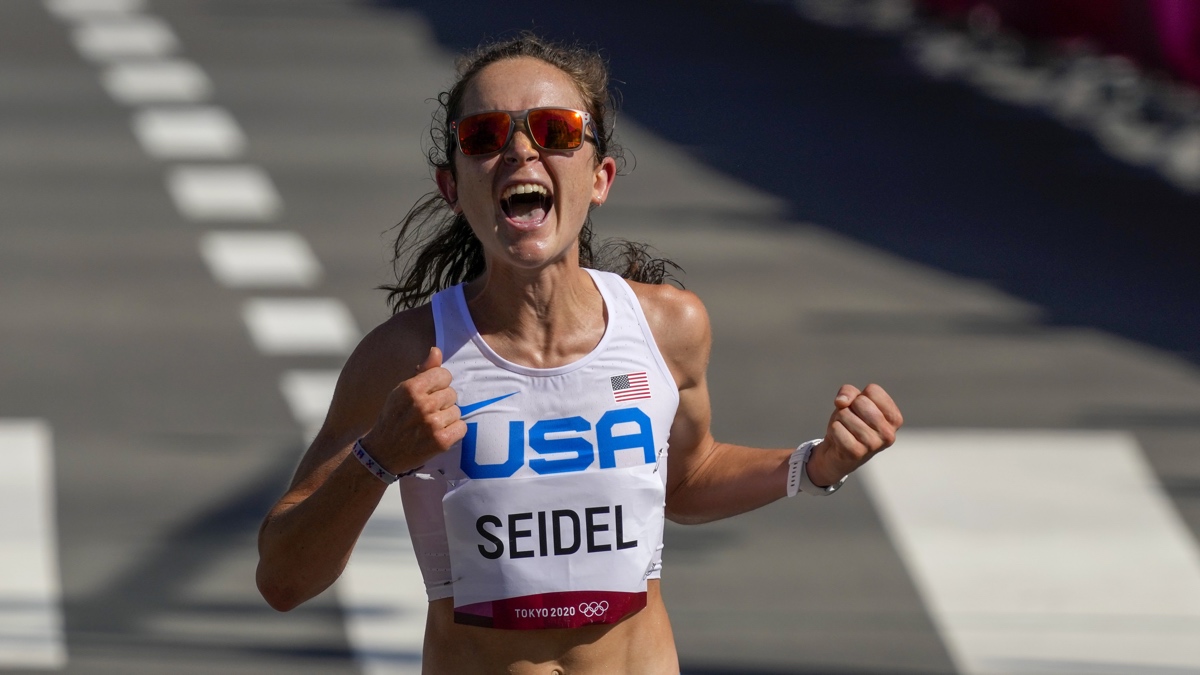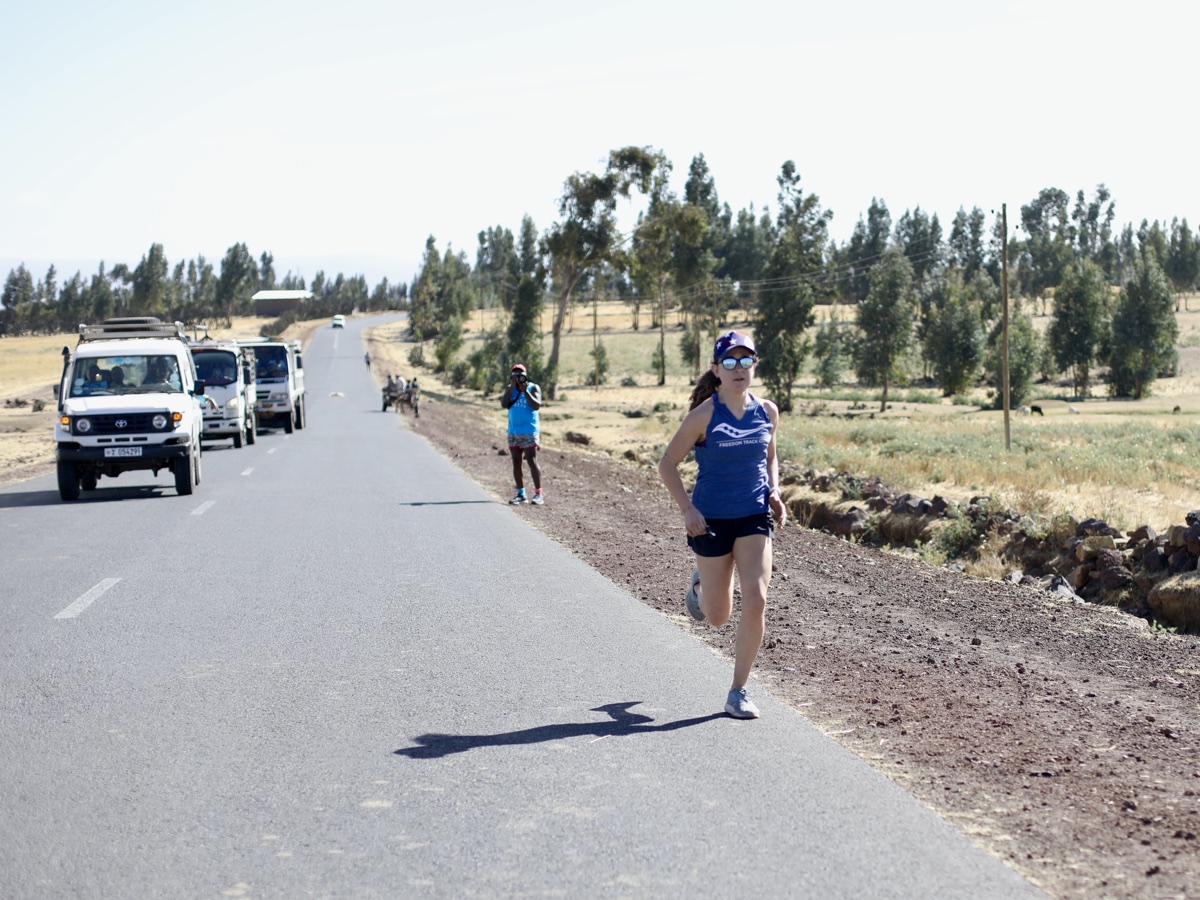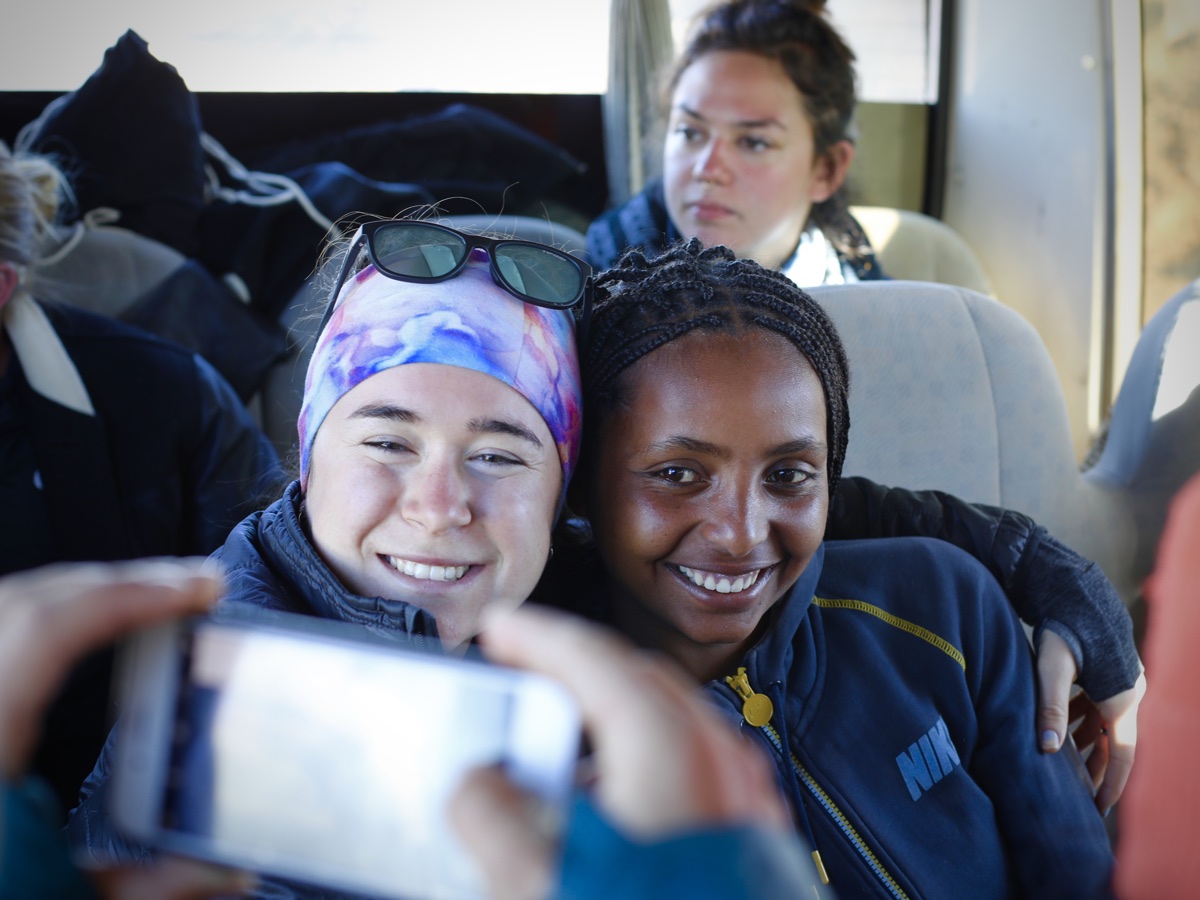Molly Seidel, of the United States, won the bronze medal in the women’s marathon at the 2020 Summer Olympics in Sapporo, Japan on Saturday, August 7, 2021. From start to nearly the finish, she ran with the lead pack, at times pacesetting for that group. The 27-year-old who hails from Wisconsin but who has been living and training in Arizona seemed calm and controlled, responding to almost every move made in the lead group and moving into medal position in the final couple kilometers. As she ran down the final straightaway to finish in 2:27:46 and 26 seconds behind winner Peres Jepchirchir of Kenya, she yelled and fistpumped, while fans around the world did the same for her.
In this phone interview the day after her race, Molly talks about staying patient for 20 miles so she could race the last six miles, the team that helped her reach this finish line, how this race is a step in her journey with mental and physical health, and how it feels to be an Olympic medalist.

Molly Seidel, of the United States, celebrates as she crosses the finish line to win the bronze medal in the women’s marathon at the 2020 Summer Olympics, Saturday, Aug. 7, 2021, in Sapporo, Japan. (AP Photo/Shuji Kajiyama)
iRunFar: Congratulations on your Olympic bronze medal, Molly! How do you feel right now?
Molly Seidel: Thank you. I’m feeling good. I’m definitely sore but feeling better than I expected. I’m just over the moon.
iRunFar: Is there anything tangible inside of you yet that feels what just happened? Or is it still this abstract thing of, “I won an Olympic medal?”
Seidel: I don’t know. The marathon is so great because you spend such long periods of time building up toward this thing. And you have no idea how it’s going to go on the day. You just trust in all that training that you’ve done. I think that’s the special thing.
There were so many people who helped me get here. Not only my coach, Jon[athan Green], but all the people I trained with. And the staff and my friends who helped me through it. And my family. It’s really fun to bring home a medal and share that with everybody.
iRunFar: I want to ask about that trust in the process. Watching you race on TV, you gave off this vibe of calm confidence.
Seidel: I figured, this is the Olympics. It only happens every four years. You might as well make a go of it. A big thing for me was to not be afraid, to go out at the front, and to make some moves. I’m not sure I ever thought I’d be in that position, to be at the front of the Olympic Marathon and be the one pushing the pace. I was trying not to think too deeply about the women who were around me and to be like, “Okay, you’re feeling good. You’re in it. Let it flow.”
iRunFar: Lots of people have been talking about the weather conditions. What was it like?
Seidel: Oh, wow. I’m very glad that they moved the start up an hour, so it was a little cooler to begin. But by about halfway, you really started feeling that heat baking us. I was pouring water on myself constantly. Our Team USA support crew was handing us ice towels. It was a matter of keeping water on the body, to keep that core temperature down.
iRunFar: You come from the Upper Midwest, the land of heat and humidity. And you’ve been training in the warm desert in Flagstaff, Arizona. Did you feel uncomfortable? Did you feel comfortable? Was it at the edge? What was it like?
Seidel: We had really focused on that preparation for heat and humidity. Even last summer, training in Boston[, Massachusetts,] running with a mask. And not only in Wisconsin, but the New England summers. I felt like all that was very good preparation.
Also, humidity training is kind of like altitude training. It’s very difficult. But once your body adapts, you’re able to handle it better. We did a lot of work focusing on what the conditions were going to be and I’m very glad that we did.
iRunFar: I think you have trained with trail runners and ultrarunners in Arizona? Given that iRunFar is trail running and ultrarunning focused, I have to ask.
Seidel: In Flag, trail running is so big that road running almost plays second fiddle, despite the number of elite road runners who come out there. I think that’s one of the best things, is being able to go hit the trails. I live right near trails. On some of the freer days, we run up on the San Francisco Peaks and down in Sedona. I feel like trail running is an adventure whenever you go. I love it.
iRunFar: Could you talk about how the race played out strategically? From my view on TV, it followed the standard marathon race format where there’s a big group together for a very long time. Then in the second half, every few kilometers, somebody drops off until it was just three of you left with a few kilometers to go.
Seidel: I love championship-style racing. I’m not necessarily the kind of person who’s going to knock out a 2:20 marathon. I’m the kind of person who can really gut it out. I was glad that because of the conditions, the race went out a little bit slower and it was a matter of staying patient in those beginning miles. You try to focus on front loading your nutrition, getting in that hydration early. It’s almost like the first 20 miles are preparing your body to fully race the last six. During that time I was focusing on staying up in the front, staying out of the fray of this huge group of women, and putting myself in position to do well in the latter half.
After that people just started peeling off one by one. Then, suddenly, the group was down to four or five of us in that last lap. I remember seeing my coach, Jon, and Mike Smith, a really good friend of mine in Flagstaff. The two of them basically said, “The moves are going to be made. Be mentally ready.” And then I just tried to hang on for dear life.
iRunFar: From where do you get your patience, to be able to sit tight in the Olympic Marathon for 20 miles?
Seidel: A lot of it comes from training and practicing that. We do a lot of longer progressions, these long runs where you have to gauge your energy throughout. But it’s still hard sometimes. It’s hard knowing when to push, when to go. I feel like I very rarely go into these races with plans. The day before, Jon and I were talking, “You don’t know how the race is going to go. You’ve got to stay flexible and respond as it comes.” And part of that is being able to sit back, watch the people around you, and be ready when the move happens to be aggressive and go after it.
iRunFar: What were the last hundred meters like? How did it feel to cross the line in third place?
Seidel: It’s wild. Your legs are so tired. That final straightaway was so long. But knowing that I had enough of a lead to take bronze, I was able to finally enjoy that last hundred meters and to think, “This is actually happening.” I think the screams that I was letting out over the finish line are pretty indicative of how I was feeling.
iRunFar: Building up over several years toward the Olympics is already a long process, but this time delays from COVID-19 made it even longer. What was it like to have this day finally come?
Seidel: The relief came when the starting gun went off. There was so much just getting to the line, the postponement, not even knowing if it was going to happen this year, and the little injuries that come up. Just getting to the starting line and feeling ready was like, “Okay. I spent a year and a half preparing for this day. Let’s go. This is the fun part.”
iRunFar: I love that the relief came at the start of the race for you. My last question, you have become an advocate for the mental and physical health journey of runners by sharing yours so openly. I know in my peer group there are many who look up to you for this. You’ve seen some things in your running career, experienced some real lows and now this incredible high. What do you have to say to those who are on their own health journeys?
Seidel: There were times where I didn’t know if I was ever going to come back. I remember being in treatment, talking with my therapist, and he was like, “You don’t have to do this anymore. You don’t owe it to anyone to keep doing this.” And this was after I’d won the NCAA titles. I remember sitting there thinking, “But I know that I’ve got more in me. I owe it to myself to keep going after this.”
No matter how much someone is struggling or where they’re at, just knowing deep down that it can get better is so important. You can get through it. And you owe it to yourself to be fully mentally healthy as well as physically healthy. Once you can sort that out, anything’s possible.
I never thought I would get to this point again. I’m so grateful for the people around me who supported me through the really tough times to get me to these amazing moments again.
iRunFar: As a journalist, I’m supposed to stay objective, but you inspire the hell out of me. Congratulations, Molly.
Seidel: Thank you so much.
[Author’s Note: I had the huge pleasure of spending a week in Ethiopia with Molly Seidel in early 2019, when we were part of a group participating in the Bekoji 100 Mile Relay, an event supporting the nonprofit Girls Gotta Run Foundation. Learn more about Girls Gotta Run and the Bekoji 100 Mile Relay. For fun, below are a few photos of Molly from the event.]


